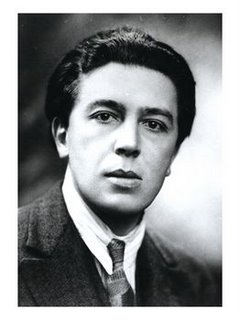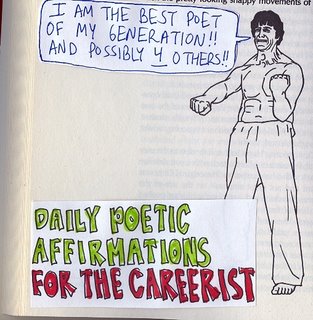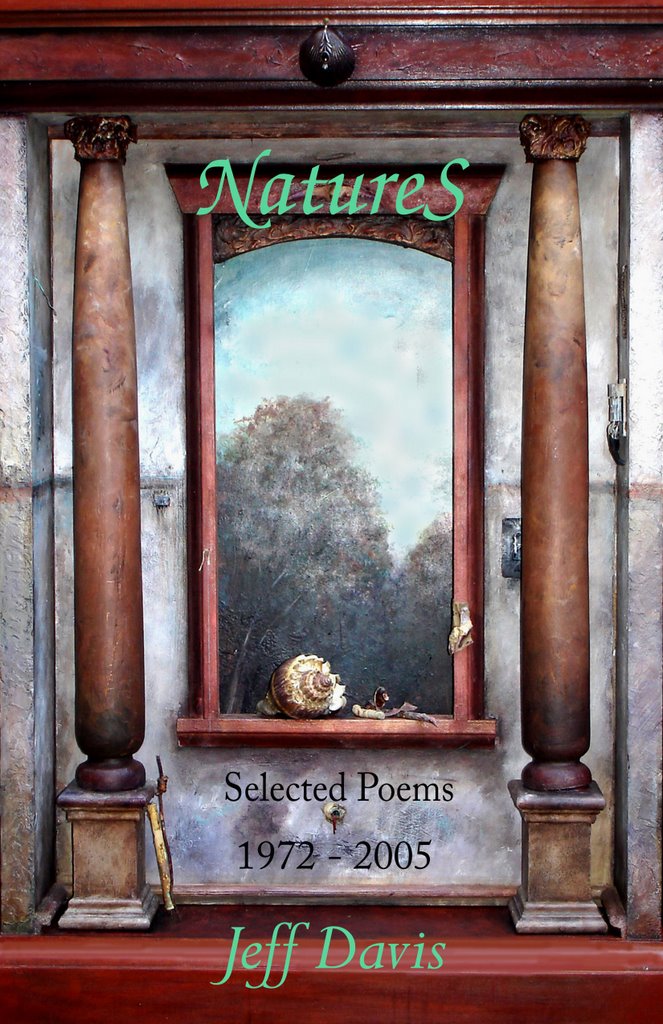Thomas Rain Crowe: Some Poems from Radiogenesis
 Regular readers here (what a concept!) will probably recognize the name Thomas Rain Crowe. He’s read at the Black Mountain College Museum + Arts Center several times (was instrumental, in fact, in pulling together the series of readings there in 2004 and 2005 that celebrated the Beat poets), has been interviewed several times on WordPlay, and in general been no stranger to the pages of NatureS - the blog as well as the book, which his New Native Press published. He’s been active as poet and editor since his days in San Francisco as a member of the Baby Beats, some thirty years ago. While he was in the Bay area, he co-founded and directed the San Francisco International Poetry Festival. During the 1980s, after he’d moved to the mountains of Western North Carolina, he was a founding editor of Katuah: A Bioregional Journal of the Southern Appalachians, and founded New Native Press. For six years he was Editor-at-Large for the Asheville Poetry Review.
Regular readers here (what a concept!) will probably recognize the name Thomas Rain Crowe. He’s read at the Black Mountain College Museum + Arts Center several times (was instrumental, in fact, in pulling together the series of readings there in 2004 and 2005 that celebrated the Beat poets), has been interviewed several times on WordPlay, and in general been no stranger to the pages of NatureS - the blog as well as the book, which his New Native Press published. He’s been active as poet and editor since his days in San Francisco as a member of the Baby Beats, some thirty years ago. While he was in the Bay area, he co-founded and directed the San Francisco International Poetry Festival. During the 1980s, after he’d moved to the mountains of Western North Carolina, he was a founding editor of Katuah: A Bioregional Journal of the Southern Appalachians, and founded New Native Press. For six years he was Editor-at-Large for the Asheville Poetry Review.Having worked with him as an author, I know that he’s a real editor and has a quick eye and ear for the activity of the poem; NatureS is a better book than it might otherwise have been thanks to his close attention.
His books include The Laugharne Poems (which was written at the Dylan Thomas Boat House in Laugharne, Wales); his territory-opening anthology of contemporary Celtic language poets, Writing The Wind: A Celtic Resurgence; and his translations of Hafiz (Drunk on the Wine of the Beloved: 100 Poems of Hafiz), published by Shambhala in 2002. Zoro’s Field, a memoir of his three years living off the grid in a small cabin near North Carolina's Green River, won the Ragan Old North State Award for the best book of nonfiction in the state of North Carolina for 2005. His work was featured in Baby Beat Generation, and earlier this year he led a cadre of his old San Francisco crew to France for a reading tour.
There’s always been a Surrealist current in his work, and one of his finest translations, I think, is 10,000 Dawns, written by French-German Surrealist poet Yvan Goll and his wife Claire, which Crowe translated with Nan Watkins. These new poems, from a project he calls Radiogenesis, find him shaman-singing, image-spinning, calling up spirits with chants that glimmer with the deep colors of the surreal.
He lives in Tuckasegee, where he writes features and columns on culture, community, and the environment for the Smoky Mountain News.
THE CALLIGRAPHY OF FIRE
“We are neighbors of fire.”
-Ann Carson
Where the warm-blooded fish is mad with
the moon in the man talking in tongues I
sit amidst dowsing darkness tired of rain.
Knee-deep in the mud of love like a man who
washes windows with the tears of a bell, near the
high-heeled trees, near commitment to the
knifeblade of a kiss, the searing heat of the word “sweetheart”
makes love to the tongue that brought an end to talk
wagging like the blasphemy of the color blue in
a lost weekend of dreams.
Voiceless, my pricked fingers bleeding ink
dance across what were once bridges
now only the white mud in the thunder of silence
playing bingo with balls, playing
preludes of a Mardi Gras ghost on the
wavelike pipeline of pain moving toward sand like
the chambered nautilus in a Chinese book.
Here where the wallow of fame flooded from the lack of light
makes moonshine make me look like a confessed criminal, like
the sun stealing the rings of Saturn from space, I
kneel to nothing not even the knees of the she-god king
stroking my sleep like brushstrokes over the flames of an
open fire and the sounds of midnight like morning
singing Hail-Marys in the rain....
LEARNING LATIN
From the point of no
return I reach for
the moon in the movement of
morning after the radiogenesis
of sleep sleepwalking the
somnambulist floor for hours and
all night when nothing but the
starry-eyed hoot of the owl outside sings
“won’t quit you babe” to the beelzebub light
in the street so bright not even the blind
can sleep, can snore loud enough for
summer to know it’s spring somewhere when not even
a crocus could care, could call a spade a spade
enamored of lies.
Here, the hic, haec, hoc, huius, huius, huius
of the verb to be can’t even comb its own hair,
can’t castrate a noun for the rape of hunger or the forethought
of a hundred bucks barking up the tree of greed going
out of sight into the ozone of oil and the mother of
all wars whenever there is nothing to do but be
homeless under the exegesis of stars and be free.
MIDDLE CLASS
May the love of money become a mask
for our times twiddling its thumbs in the dark
and dreary photosynthesis of sleep
snoring so loud that only a poem could
talk above the roaring silence of sex
making out with the hard-body of handguns
aimed at us all as if we were Indians
and they were a waging war. A war
so willy-nilly it turned infantries to ice
doing the right thing for the wrong reason
that went to the dogs
and the doggerel of mindless talk turning
into fistfights for peace as if the world was
the front row in church
counterfeiting the collection plate in the name of God
and calling it damn, dark, or duty-free rent
like landlords that want to be The King of May
for the price of a gizmo in a garage
that only the neighbor sees and wants
after a day of work becomes a fix beyond
the point of pain
like a bus stopped at the white in our eyes
like light was or would be if it went out and
in darkness all that nothing we learned in school suddenly
came down crashing
on our heads.
MODERN
With eyes now the tongue of language,
the book is buried for all time in
a bed of grass being raised from the dead
in our dreams,
in an age of the dumb and numb of clocks
becoming the digital dogma of waking
in the arms of an electric lover or
a fallen woman without name or face.
With touch-tone tempest we
will cry computer age tears when
the sky falls and the words for help
are forgotten like memory banks buried
forever in history books now only ancient
ice-age ice cold and frozen solid from
liquid days wondering whether they are
maybe earthbound nights trying to sing in the
key of love longing for the rapture of
simple stillness in the sound of a single
stick against wood or
a splash of ink as
the forgotten longed-for promise of words.
FROZEN MUSIC
for Joy Harjo
Never was the never in nearsighted closer to
this heart of rain seeking the storm. Dark clouds of brilliance
rubbing the back of these hills. How hallowed ground
has grown again into the almost of sacred space.
Only love could have given this tongue a song. Sheer jazz
from a jew’s-harp of trees tricked by wind. Tricked
and trapped in the riddle of my name. Hidden in
the implicate order of space. After eons. Behind the
hologram of race.
The better the story the bigger the bang.
And the loud noise of the fire asleep slides off into
the silence of unknown sound. Sacrilege to the thought of
summer lusting after the memory of sex with spring.
Lips discovering the trade-routes of thighs. Hands holding hills
of snowflesh more hallowed than the holy grail.
Given is what is gotten back. A frozen music.
A jazz in love with the isn’t of ice. The kiss of death. Of spice!
Beyond the bare-breasted moon and bimbos of the Milky Way,
Beethoven records his first hit. In the night below zero
with a wind-chill of a million to one. Rough odds
going against the snake-eyes of war. The boxcars of space.
Or the fugue of a frigid bride.
Never was the upbeat genesis of fame so close to cash. Like
trying to get a grant from God. A farm for a few farthings.
Or the world in a card game of empty bucks.
Beyond where the gray rain of birds train for miles across mountains
of smoky grace, is pigment of painted place. Landscapes frozen in
acrylic time feeding on the afterthought of nails
pounding like angry waves, like lost loves in a lifetime,
against the apocalyptic shore.
~~~~~~~~~~~~~~~~~~~~~~~~~~~~~~~~~~~~~~~
The photo finds Thomas earlier this year at Shakespeare and Company in Paris, during his French tour on behalf of the bilingual anthology Baby Beat Generation.
Major portions of this material appeared in different form in the Rapid River for November 2006.
Labels: Nan Watkins, poems, poets, RR, Thomas Rain Crowe, Yvan Goll





